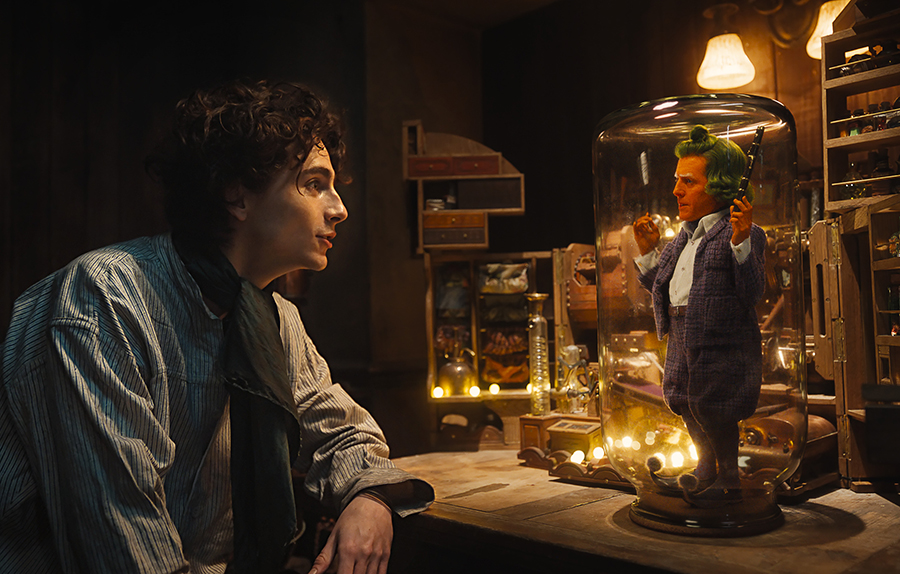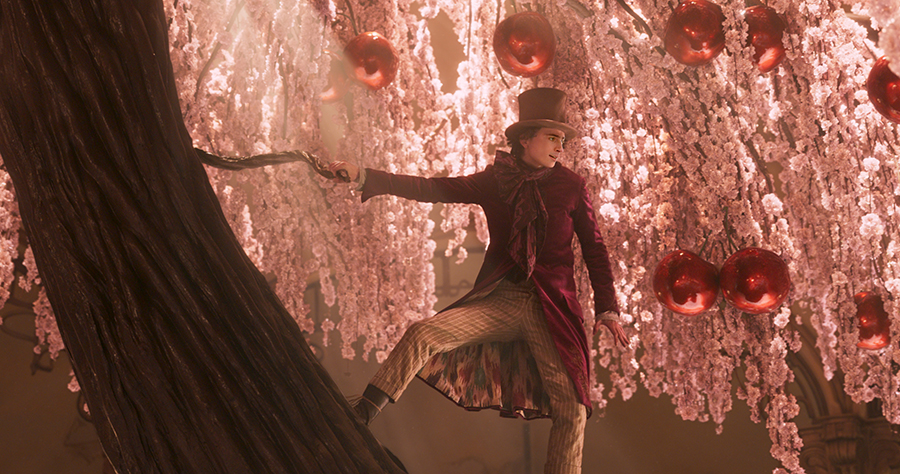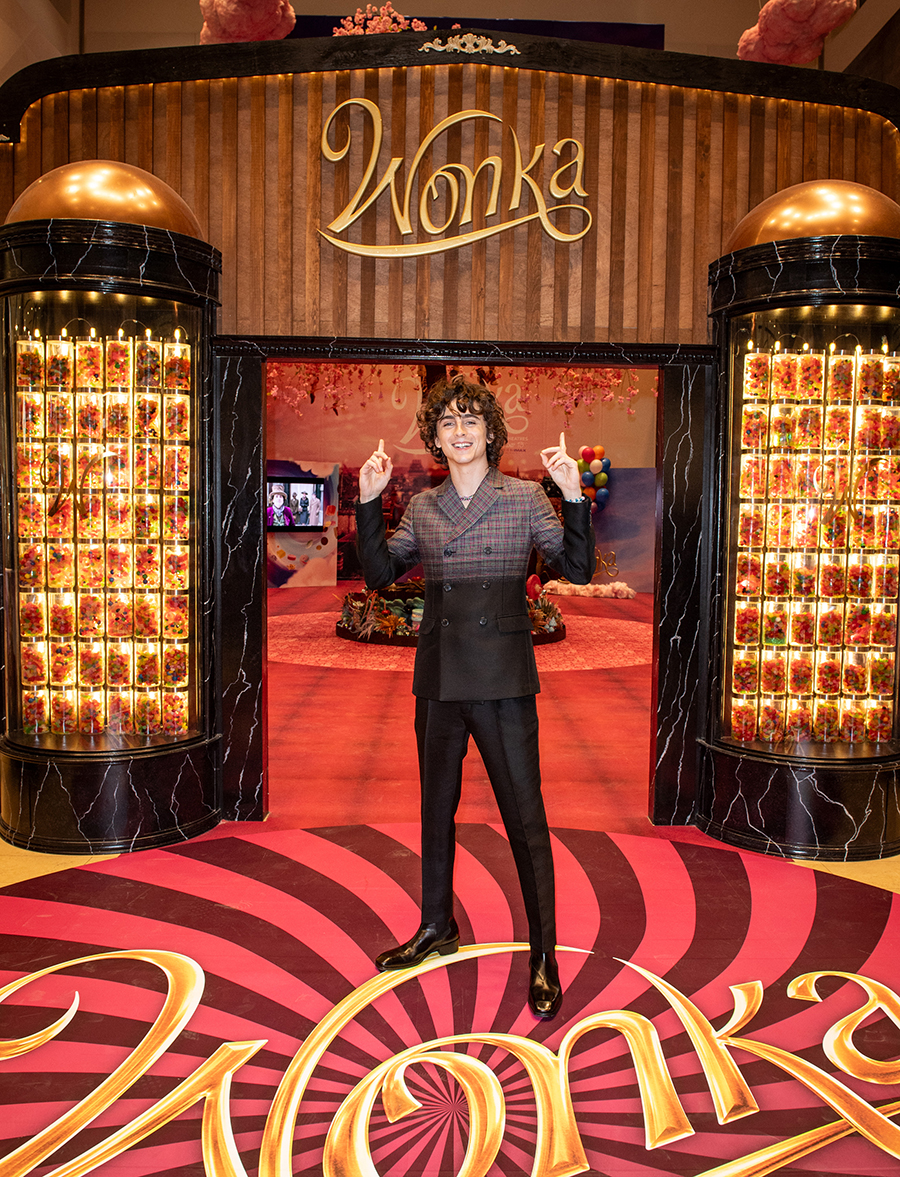No Golden Ticket: New ‘Wonka’ Film Offers a Sweet Treat But Lacks the Spirit of the Original

Timothée Chalamet stars as Willy Wonka in 'Wonka,' a prequel to the legendary story of the eccentric chocolate factory owner. Photo: Courtesy of Warner Bros. Pictures
Timothée Chalamet tips his chocolate-coloured top hat to Gene Wilder in Wonka. The heartthrob from Call Me By Your Name and Dune gives a kind-hearted performance as the titular confectioner and entrepreneur, borrowing gestures and expressions (“Scratch that. Reverse it.”) from Wilder’s original screen incarnation in 1971’s Willy Wonka and the Chocolate Factory without quite capturing the spirit the late actor and comedian gave the role.
Wonka, arriving just in time to dominate as the holiday season blockbuster, whips up an origin story for the character who was originally published in Roald Dahl’s 1964 classic Charlie and the Chocolate Factory and who has enjoyed a cultural staying power over the past six decades similar to The Wizard of Oz. Perhaps even more so.
There has only been one version of Oz that still strikes a chord (we’ll see how the upcoming Wicked movies do). But more generations of children have connected with Wonka through the book than the onscreen version starring Wilder. Even Johnny Depp’s singular Michael Jackson-inspired take in 2005’s Charlie and the Chocolate Factory is an incarnation the new Wonka would much rather ignore.
In the warm and whimsical new musical, Chalamet’s Wonka arrives in a lovely cobblestoned European mecca for chocolatiers with meagre resources, secret recipes and limitless ambition. So many of the characters Wonka meets are reconfigurations from the original texts, like Hugh Grant’s grumpy scene-stealing Oompa Loompa, who prowls through the night relieving the chocolatier of his goods, or a young orphan (Calah Lane), who evokes Charlie Bucket by becoming the heart of the movie and winning Wonka’s affections. They end up being the innovator’s allies as he butts heads with a greedy chocolate cartel and other hustlers exploiting human labour, villains inhabiting traits we saw in characters like Augustus Gloop, Veruca Salt and … well … Wonka himself.

Here’s where Chalamet’s Wonka, who often doles out just desserts by accident, departs from his predecessors. He’s not just the nicest, but also naïve, which, with the actor’s vanilla performance, makes him one of the least interesting characters in this reimagining.
Chalamet is not giving Wonka energy. He’s more cuddly, like Paddington, perhaps because this movie comes from Paul King, the writer and director who gave us those joyous movies about the marmalade-loving bear from darkest Peru.
The Wonkas that came before, on the other hand, were more like benevolent authoritarian figures who can lean cruel. Wilder’s Wonka had a soft voice and inviting eyes but there were always undercurrents of disdain and malevolence. When he sings Pure Imagination (which is covered in the new movie by Chalamet, despite his lacking vocal range), the gummy pleasantries in the lyrics are undercut with the sharp whip of his cane, which he uses to marshal his audience. And then, of course, as with the novel, there are the various traps seemingly masterminded to punish the greedy, gluttonous and demanding children taking his tour.

Wilder’s Wonka is essentially a paternalistic figure, the kind who imports labour from another island and positions himself as their saviour. His generosity goes hand-in-hand with a tendency to lord his power over those less fortunate or idealistic than him. His complexities, along with the story’s wariness over capitalist greed and waste, interacted with the moment that both Dahl’s novel and the movie came out: after the post-war economic expansion of the ’50s and ’60s, when the traumas of European destruction and Nazi Germany and a wariness over socialism still lingered in the landscape.
Willy Wonka and the Chocolate Factory responded to those with sinister images of capitalism and consumption: overflowing waste, televisions dominating every corner, the black gate at Wonka’s factory where the chimney keeps smoking through the night. Couple those aesthetics with a curious in-joke when the photo of a fraudster from Paraguay who tried to fake a golden ticket appears in the newspaper. The photo they use is actually that of Martin Bormann, Hitler’s private secretary.

Tim Burton’s Charlie and the Chocolate Factory, arriving in 2005 while America was still reeling from 9/11 and the war on Iraq, was aesthetically insulated from world events but also eagerly embracing and enhancing the darker tones in Dahl’s book, which felt so fitting at the time. Burton found the overlap in his own expressionist tendencies and the original text, making his movie a flawed therapy session about the trauma parents pass on to their children. Depp plays Wonka as a neurotic, obsessive and occasionally monstrous man-child constantly appearing as if he was on the edge of self-combustion.
Chalamet’s Wonka, embarking, like Paddington, on an immigrant’s journey, is arriving during a housing crisis while the population is being shocked by exorbitant grocery prices. That’s something of a raw nerve that the film’s story about exploited labour with the odds stacked against them may touch.
But instead of absorbing the bitterness felt at this moment, this Wonka drowns it in chocolate.
RELATED:
2024 Golden Globes: ‘Barbie’ and ‘Succession’ Lead Nominees, While Meryl Streep Sets New Record